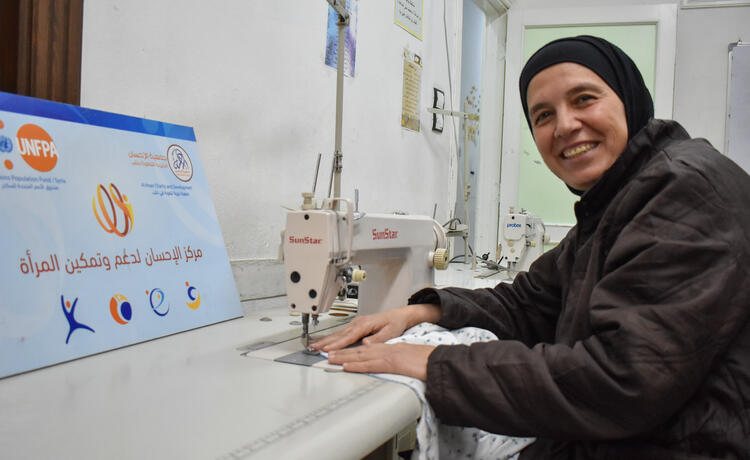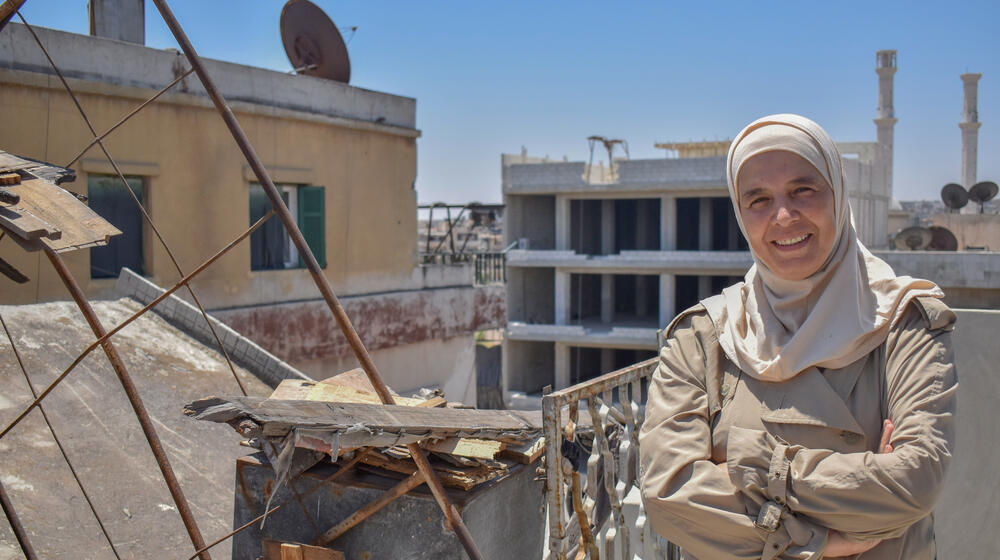ALEPPO, Syrian Arab Republic – “My suffering started with the crisis in Syria, then the economic situation got worse, and the last straw was the earthquake.”
Najwa Bikdash, 52, is from the Bustan Al Zahra neighbourhood in Aleppo. After 20 years of marriage, her husband abandoned her and their four daughters, leaving the family to fend for themselves financially. But years of marital emotional abuse had left Ms. Dikdash’s self-esteem in tatters: She couldn’t see how she would be able to survive alone.
Determined to take care of her daughters, she discovered a training course and counselling services at a local safe space for women and girls, supported by UNFPA, the United Nations sexual and reproductive health agency. Slowly, she began piecing her life back together.
“I’ve been visiting the safe space for five years now, and I’m learning handicrafts and baking skills at the women’s support centre,” she told UNFPA. “I’ve come to realise there is nothing wrong with me as a divorced woman. On the contrary – I can achieve a lot.”
But the destruction of her home and rippling insecurity from February's catastrophic earthquakes pushed Ms. Bikdash to the edge. Fear and anxiety took hold as she was forced to move from one overcrowded shelter to the next, with scarce assistance available.
Her only refuge was the safe space, where psychosocial support sessions gave her back a sense of security she felt she’d lost with the disaster. “Counselling helped rebuild my confidence brick by brick,” explained Ms. Bikdash. “Now I plan to set up my own business to finance the repairs to my house.”
A space to heal – and to learn

Every day, more than 50 women visit the UNFPA-supported safe space in Bustan Al Zahra, which is one of five operating in earthquake-affected areas of Syria. The spaces offer counselling, gender-based violence response and recovery services, reproductive health support and the chance to learn livelihood skills so women can become financially independent.
Following the earthquakes, the safe space also provided shelter and emergency first aid training tailored to women and girls caught up in crises. This helped Ms. Bikdash to better deal with the condition of her daughter, who suffers from convulsive seizures, and introduced her to best practices in the event of an earthquake.
It was training that came in useful sooner than she’d hoped, however, when another earthquake shook Aleppo on 25 July. Ms. Bikdash told UNFPA, “I’m scared because my house is cracked, I fear it may collapse. Six months after the last earthquake, I am tired. I always feel frustrated.”
Hundreds of thousands of women and girls who lost their homes in the disaster are still living in unsafe, informal settlements. They have limited access to reproductive health and protection services and little privacy or electricity – with a lack of toilets and hygiene facilities a particular source of distress.
Gender-based violence, exploitation and abuse and child and forced marriages are all reported to have increased, along with rising domestic violence by intimate partners. Although mobile protection services, outreach and tent shelters were all ramped up in earthquake-affected areas, prevention and response mechanisms have been severely disrupted and case management has proved challenging as people move almost constantly between shelters and camps.
Reaching the most vulnerable in a crisis
From the start of the crisis in Syria more than a decade ago, and even in the aftermath of the destructive earthquake, UNFPA has worked with partners on the ground to ensure reproductive health and protection services reach all women and girls in need, wherever they live.
Since February 2023, UNFPA has reached more than 368,000 people in earthquake-affected areas in Syria with reproductive health and protection services through safe spaces, mobile teams and one-stop centres. UNFPA is appealing for $182 million to continue championing the rights of women and girls in Syria and those displaced across the rest of the region.
“In the midst of these difficult events, I see that the women’s support centre is the best thing that happened to me,” said Ms. Bikdash. “I told all the women in my neighbourhood to join, to benefit from the programmes offered… I’m proud of what I have become!”


